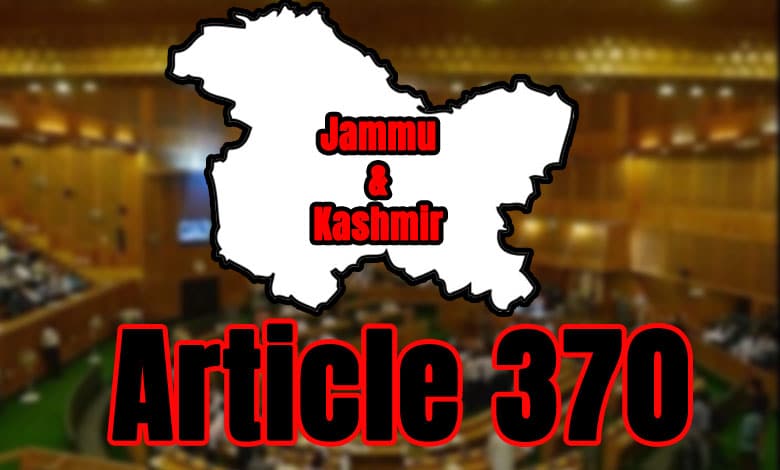Jammu & Kashmir Assembly Passes Resolution to Restore Article 370
Srinagar: In a highly contentious move, the Jammu and Kashmir Legislative Assembly on Wednesday passed a resolution calling for the restoration of Article 370, which grants special autonomy to the region.

Srinagar: In a highly contentious move, the Jammu and Kashmir Legislative Assembly on Wednesday passed a resolution calling for the restoration of Article 370, which grants special autonomy to the region. The resolution, presented by Deputy Chief Minister Surinder Choudhary and seconded by National Conference (NC) leader Sakina Masood, was passed amidst intense uproar by opposition lawmakers from the Bharatiya Janata Party (BJP).
The resolution comes on the third day of the Assembly’s current session and was introduced in response to the controversial revocation of Article 370 by the Indian government in August 2019. While the resolution itself carries no immediate constitutional impact, it represents a significant political stance taken by the Jammu and Kashmir government, led by the National Conference (NC).
Also Read: J-K Assembly proceedings disrupted amid uproar over resolution on special status
Key Points of the Resolution
The resolution, which reaffirms the special constitutional guarantees that once safeguarded the identity, culture, and rights of the people of Jammu and Kashmir, calls upon the Government of India to initiate a dialogue with the elected representatives of the region to restore the special status. It states:
- “This Assembly reaffirms the importance of the special and Constitutional guarantees, which safeguarded the identity, culture, and rights of the people of Jammu and Kashmir.”
- “The Assembly expresses concern over the unilateral removal of these provisions and calls for dialogue to restore them.”
- “This process must safeguard national unity while addressing the legitimate aspirations of the people of Jammu and Kashmir.”
Despite its limited legal effect, the resolution is a clear signal of defiance against the central government’s move to abrogate Articles 370 and 35A, which were revoked by the Indian Parliament in August 2019. The abrogation was upheld by a Constitutional bench of the Supreme Court, which ruled that Parliament had the power to amend or revoke these provisions.
BJP’s Strong Opposition
The BJP, which strongly opposed the move, voiced its objections during the Assembly session. Sunil Sharma, Leader of Opposition in the Assembly, raised a point of order, questioning the propriety of introducing such a resolution while the house was engaged in a debate on the Lieutenant Governor’s address. Sharma accused the government of bypassing the established procedure for introducing such resolutions.
Amidst the growing tension, the opposition and some independent members, including Sheikh Khurshid Ahmed, Shabir Ahmad, and Sajad Lone of the People’s Conference (PC), supported the resolution. In a show of unity, three MLAs from the Peoples Democratic Party (PDP) also backed the motion.
Speaker Adjourns Assembly
The Assembly was thrown into chaos as BJP members continued to protest. In the midst of the commotion, Speaker Abdul Rahim Rather was forced to adjourn the session for 15 minutes.
Despite the disruption, the resolution was put to a vote and passed by a majority in the house, sending a strong political message of defiance against the Centre’s decision to revoke the region’s special status.
Political Implications
Though the resolution will not bring about any immediate change to the constitutional status of Jammu and Kashmir, it brings the J&K government into direct confrontation with the Indian government. The National Conference, which has been one of the vocal critics of the abrogation, now seeks to elevate the issue on the national political stage. The government of Jammu and Kashmir is hoping that this motion will increase pressure on the Centre to engage in dialogue over the region’s future.
In practical terms, the passage of the resolution is unlikely to reverse the revocation of Article 370, which was legally challenged and upheld by the Supreme Court. However, the political symbolism is significant, as it underscores the continued division between the Union government and the regional leadership in Jammu and Kashmir.
The move is also likely to reignite discussions on the special status of Jammu and Kashmir, which has been a flashpoint in Indian politics for decades.
Looking Ahead
As the political situation in Jammu and Kashmir remains tense, the resolution is expected to influence the ongoing debate about the region’s future. While the resolution’s passage might not lead to immediate constitutional changes, it will likely continue to serve as a point of contention in the wider national discourse on federalism, autonomy, and the relationship between the Centre and the regions.
The controversy surrounding the issue is far from over, and both the government of Jammu and Kashmir and the BJP-led central government are expected to continue their struggle over the future of the region’s autonomy and special status.
